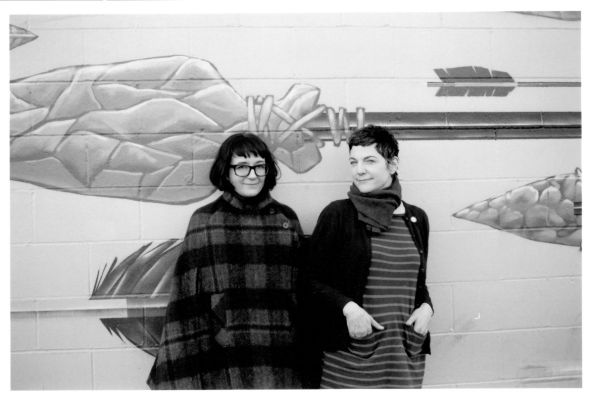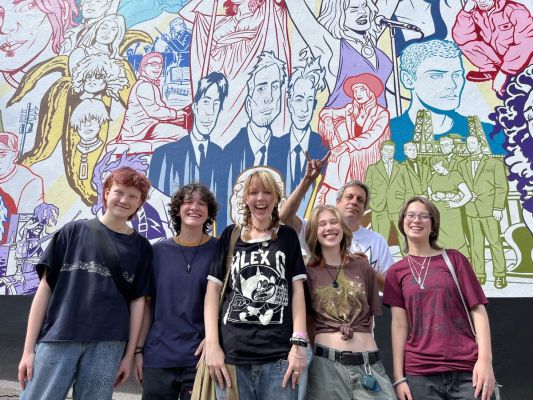Home > Indie
12/08/2023
The Softies: Q&A with Jen Sbragia / Punk Our Own Way
By CLARA KORNELIS // Interview with Jen Sbragia: The Softies and Portland’s indie-pop movement of the ’90s.
This is Clara Kornelis' first story for OMN. She is a student at Portland's NW Academy.
- - - - - - - - - - -
I first heard The Softies last winter and was immediately struck by their beautiful simplicity. I had never heard a band just like them before, with music full of personal and genuine lyrics over subdued, melodic guitar riffs. I reached out to Jen Sbragia, and asked for an interview. I was curious how Sbragia and collaborator Rose Melberg had come to find their unique, vocal-focused sound. Not only are The Softies still active, but they have recently been touring and have an album forecasted to be released in 2024.
After almost 20 years, it was a welcome surprise to their fans that The Softies returned to the stage, going on tour with Tony Molina in 2023. When Gail O’Hara, co-founder of chickfactor Fanzine, reported on her chat with The Softies last May after they released their Northwest Tour Tape on Bandcamp, she expressed, “When we put The Softies on the cover of chickfactor 18 back in 2018, we had no idea [you] would be coming back together to MAKE A NEW ALBUM and TOUR!” The Softies, Rose Melberg and Jen Sbragia, set out to play a short Pacific Northwest tour with Tony Molina, All Girl Summer Fun Band, and Mo Troper in 2023.
Back in the ’90s, the music scene of the Pacific Northwest was dominated by grunge, punk, and loud indie rock bands, until a group of West Coast-based indie pop musicians shook up the norm. This group of softies included many artists, most notably Elliott Smith, Kissing Book, Tullycraft, and of course The Softies themselves.
These bands were intertwined through a few indie record labels: K Records, Slumberland Records, and Magic Marker Records. The bands would take turns performing at the Magic Marker house, in co-founders Curt Kentner and Mark Rothkopf's basement. One major group that came from this tight-knit community is The Softies, a duo formed in 1994 and made up of Rose Melberg and Jen Sbragia. Usually classified as “twee pop,” a term not so popular within the community, The Softies navigated their own path between that label and the hard-core scene of the time.
Growing up on the heavy metal scene of 1980s Santa Rosa, California, Sbragia was used to the harsh disconnect fans had from their favorite artists. But after finding Sacremento band Tiger Trap, Sbragia fell in love with their unusual indie pop sound. “I was a super fan, and I had plans to go to every show. I wanted to see them a hundred times.” But then they broke up. Luckily, one night after a Tiger Trap show, Jen had approached their lead singer, Rose Melberg. In contrast to Sbragia’s usual scene, she described when she first connected with Rose as being easy and comfortable. “I could talk to her, and she was so nice and supportive and was like, ‘You should start a band.’” Soon after hearing of the end of Tiger Trap, she decided to give Melberg a call.
“I heard that Tiger Trap broke up, and I was worried that she was depressed or something. So, I cold called her. Like, ‘Hi, remember me?’” And thus began The Softies.
Melberg invited Sbragia to Sacramento, shared a song she had been working on, and invited Sbragia to help her with it. As Sbragia recalls, Melberg said, “I have this song that wasn't really right for Tiger Trap. Do you wanna write a part for it?” Sbragia accepted, and this song eventually became The Softies’ first single, Loveseat.
Unfortunately for the duo, Sbragia had already made plans to move out of Santa Rosa to Portland, Oregon. This seemed as if it would tear apart the starting threads of their band, but after a short time of separation, Melberg moved up north to live with her. They found a place and continued their songwriting together. The way Sbragia describes those years living with Melberg undoubtedly fits the Softies’ feel. “It rained a lot, and we would just stay inside and make music.”
The Softies’ sound perfectly lives up to their name. Throughout the entirety of their history, the band has only ever included Jen Sbragia and Rose Melberg, both equipped with electric guitars and sweet voices. After being asked why they decided to keep The Softies as a duo, Sbragia answered, “[Melberg] had been in a big, loud rock band. And they were getting courted by major labels, and she really did not want to be famous. She didn't want to do any of that. I feel like it was an organic thing where it was the two of us, and we didn't add anybody else. And they were softer songs, and we just wanted to be weird.” This quieter style also helped to differentiate The Softies. “We wanted to do something different because at the time it was all big, loud alternative rock bands, and we were being punk in our own way.”
With Heatmiser and other indie rock bands dominating the early ’90s Portland music scene, at first Sbragia and Melberg struggled to find their place in this unfamiliar community. “All the shows we ever played were incongruous; we always played with loud bands. Until we played with Elliott [Smith]. We went on tour with him and that was a perfect marriage. It was perfect.”
Similar to Elliott Smith’s early solo work, the music of The Softies has a soft, melancholy undertone, full of lyrics about unrequited love and heartache. Sbragia explained how important a strong emotion is for her when working on lyrics. “I've written songs about silly things too, like grass skirts and lip gloss, but I feel like the best stuff I make comes from the yearning, a crush. Someone who doesn't like you back. I mean, that was my whole twenties, trying to figure out why I kept choosing these people, and it was like my own form of therapy.”
Similar to her lyrics, Sbragia follows her gut and emotions when writing on an instrument. “When I write songs, I sit down with my guitar, and I find some chords. And I can find what key it is and then all the chords that go with this key. And that's seriously how I do it. I mean, I don't play piano. I can't read music. I just sound different things out. Or I'll learn a song that I like and then be like, ‘Oh, can I steal that chord somewhere? Maybe I'll put it here.’ So yeah, I feel like my songwriting is really disjointed; I just get along.”
During the late ’90s, The Softies played a show with another Portland band, Cherry Ice Cream Smile. The group featured Kim Baxter, and, after listening to her tape nonstop in the car while The Softies toured, Melberg urged Sbragia to start a band with Baxter. Melberg had recently made the move to Canada, so as The Softies continued long distance, Sbragia and Baxter began All Girl Summer Fun Band with Arirak Douangpanya and Kathy Foster. Sbragia said, “We're called that because Kim was going to go to Russia for a semester of school, so it was really just supposed to be an all-girl band for the summer, just for fun.”
AGSFB began without a specific goal, but only a need to share music with other artists. According to Sbragia, “If you're an artist, you’re not really doing it for a job. You're doing it to make the art. And so, it has to unfold in the natural way that it will. It really depends on the people and what they want to accomplish. Now you can do everything in Garageband. You can do everything in your bedroom.”
Sbragia finds these modern changes to be a positive, not only giving everyone a chance to make any sort of music they want but also allowing more people to consider music a possibility at all. She brought up Billie Eilish’s unique approach to the norms of modern pop: “She can take out her Invisalign and slurp, and it’s so brilliant. I like how on that first record, there’s all these weird songs and stuff. There’s no rules. Don’t let anybody tell you can't.”
While recording the album “Two” with All Girl Summer Fun Band, Sbragia asked her producer, Calvin Johnson, if they could add a record scratch. He did, and then Sbragia thought, “Wouldn't it be funny if there were a bunch of people clapping at the end of the song, but not that many people. And there were like three people clapping in one song. And I still laugh every time I hear that. It's so fun to be able to express yourself however you want. It's a gift to be able to keep doing it.”
During a time in music history notorious for its hardcore underground scene, The Softies were often considered separate from other artists, described as having a cute, fun, slumber party energy with “boy-obsessed lyrics.” Sbragia thinks of this embrace of femininity as a reaction to her upbringing within the metal scene of the ’80s Bay Area.
“Being a girl in metal is hard, and it's so rife with misogyny,” she said. “So, I was a tough girl, and then when I got into indie pop, I was like, ‘Oh, I don't have to be tough anymore.’ I can like pink sweaters and I can write songs about lip gloss, and it was like I was reclaiming my femininity that I had been shunning and shoving down. So that was my own way of feminism at the time. Just like, ‘I don't care what you think, I'm going to wear a cheerleader skirt and be silly.’”
While Sbragia found this to be personally liberating, other musicians thought it was unsupportive of a wider movement. “We felt like the riot grrrl bands were looking down upon us because we weren't using our platform to put forth a message. We were just writing about boys or maybe not boys. We were just writing about love, you know?”
When asked how this lack of support from fellow female artists affected her, Sbragia said, “It didn't really bother me. It’s interesting now to look back. But no, it's just what we wanted to do…Like with any other female artists now, there's always comments from other women and from men. But now it's a lot easier, I think it's a lot better now than it was then.”
Though the comments never really got to Sbragia, trying to find their own sound within such a different scene was still a challenge. “We really never wanted to be tough or sexy…That was our way of being punk, rejecting all of that. Just doing it this way. And we also didn't really ever care about being famous. So, we didn't want to fit a mold.”
Though those who were in the softer music scene of the nineties are often described as “Twee,” that term is increasingly unpopular within those communities. As Sbragia explained, “At the core, our softer songs are about very dramatic longing. It’s not twee at all. I think it’s just people stick that label on it because it’s easy for them. There’s a lot of bands that came after that were really going for that whole thing, but I don't hate the term. It’s just so not what we were. And it’s also kind of reducing us to a cartoon of ourselves. But I like ‘indie pop’ because it’s what it is. It's independent pop music.”
Along with tens of thousands of other indie artists, in lieu of Spotify, Sbragia has been sharing her music on Bandcamp, a self-described “online record store and music community.” She said, “I don’t want to do any Spotify stuff because it’s literally like, ‘A zillion people played your song; here's your half of a penny.’ It's so fucked up. But with Bandcamp, at least, there’s Band Camp Friday.” On the first Friday of each month, all revenue made on Bandcamp goes directly to artists, without the company taking a share.
Though Sbragia has slowly drifted from the local music scene due to starting a family and continuing a career in graphic design, there are a few bands that she has recently found inspiring. She praised Black Belt Eagle Scout’s Katherine Paul, an artist she had recently seen live. “She’s a radical feminist, queer, indigenous woman. She was really, really good. They had all indigenous people on the bill, and they had a band from Albuquerque called Weedrat play, and they were amazing. They were punk, like screamy, yelly, punk.” On Tony Molina, she said, “I love his music. We're huge fans of each other. The funny story about him is that he was a hardcore kid. And he came to an All Girl Summer Fun Band show when he was 17, and he was like, ‘Oh, I could play this kind of music.’ So he started playing pop music.” Sbragia also gets recommendations from friends and listens to new playlists. “There's so much now though, it’s overwhelming. There’s so much more now than there used to be. It's great!”
Along with this new era of music being so welcoming to new artists, Sbragia has also found it easy to return to after an extended hiatus. “I'm really excited about taking this long time off of music and then being able to do it again and that people still care, and that people want to come see it. We’re going to be playing to everybody.”
You can find music from All Girl Summer Fun Band on Bandcamp, and The Softies on Spotify and Bandcamp.
Elliott Smith at Bumbershoot Festival
Reference to Elliott Smith Documentary, Heaven Adores You
Tony Molina and the Softies-Pacific Northwest Tour 2023
Taylor Hensley I had no idea this was happening or that we would ever get any more of The Softies. This is a wonderful surprise and a treat! Thank you!
Chatting with the Softies About Their New Tony Molina Collaboration
Nowhere to go – Buddy Holly “Everyday” Buddy’s most played song on Spotify









